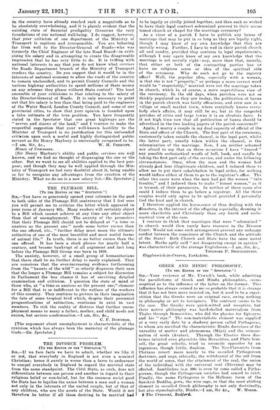GREEK AND HINDU PHILOSOPHY.
[To THE EDITOR OF THE " SPECTATOR."] SIR,—Your reviewer of Mr. Urwick's book, while admitting the parallelisms of Greek and Hindu philosophies, seems sceptical as to the influence of the latter on the former. This influence has always seemed to me so probable that it is strange that it has not been more insisted on, but it used to be a super- stition that the Greeks were an original race, owing nothing in philosophy or art to foreigners. The contrary seems to be the case. The Greeks were quick-witted and receptive, but their native philosophy was hard-shelled materialism from Thales through Democritus, who did the physic's for Epicurus and his " stye." The non-materialistic element was supplied at a very early date by a shadowy person called Pythagoras, to whom are ascribed the characteristic Hindu doctrines of the unreality of matter and phenomena (Maya) and the reincar- nation of souls (Avatar). Through the Eleatic.; these doc- trines infected even physicists like Heraclitus, and Plato him- self, the great eclectic, tried to reconcile opposites by an ingenious, though futile, dualism. The Neo-Platonists from Plotinus revert more nearly to the so-called Pythagorean doctrines, and urge, ethically, the withdrawal of the self from the world of sense, that the attainment of the real, the union of the individual with the universal soul (Nirvana) may be effected. Iamblichus (A.D. 300) is even by some called a Pytha- gorean, though the Pythagorean societies had ceased to exist. Finally, the name Pythagoras is the Hellenic form of the Sanskrit Buddha, guru, the wise sage, so that the most abiding element in so-called Greek philosophy is not only doctrinally, but also etymologically, Hindu.—I am, Sir &e., W. Mutsu.
9 The Crescent, Bedford.


































 Previous page
Previous page